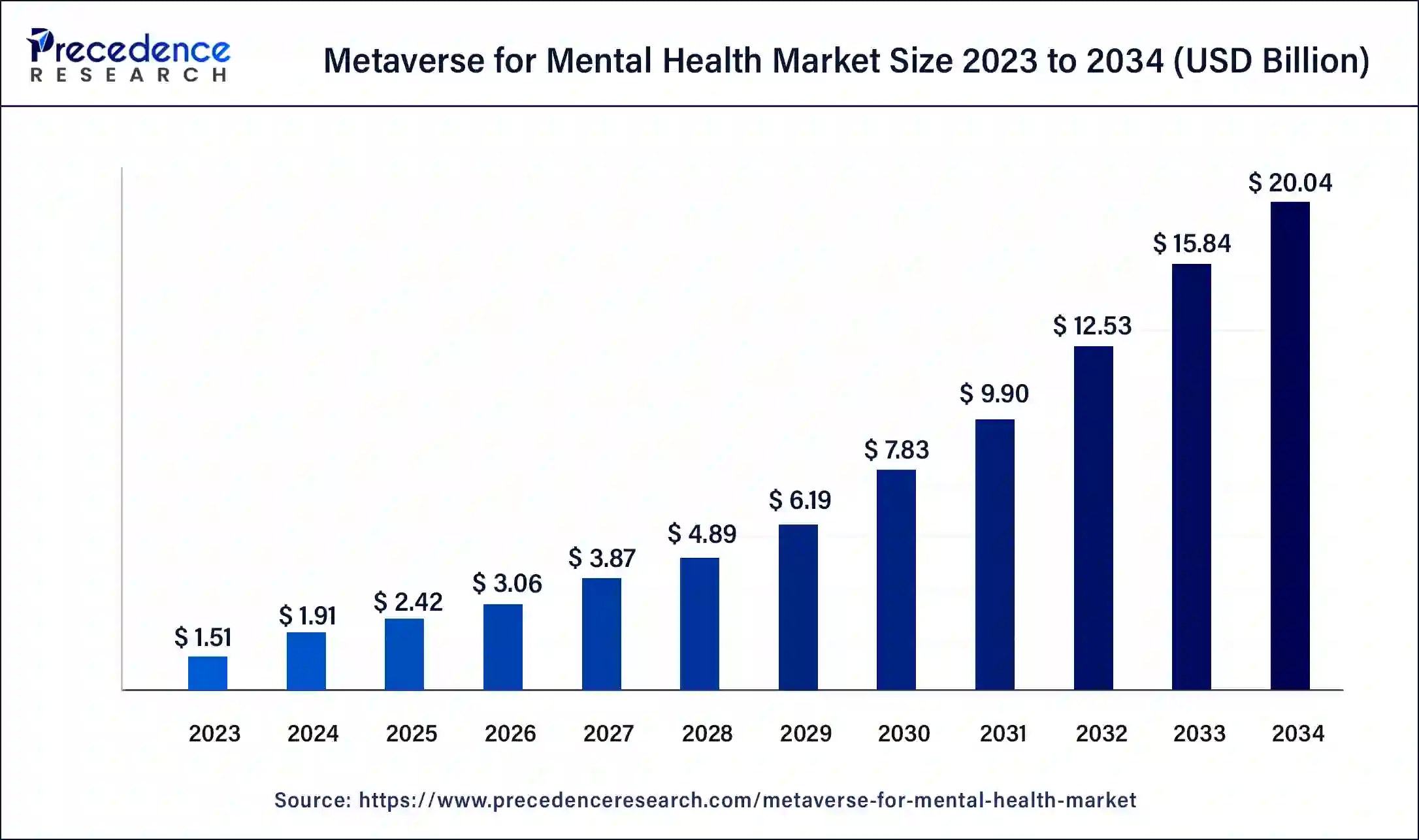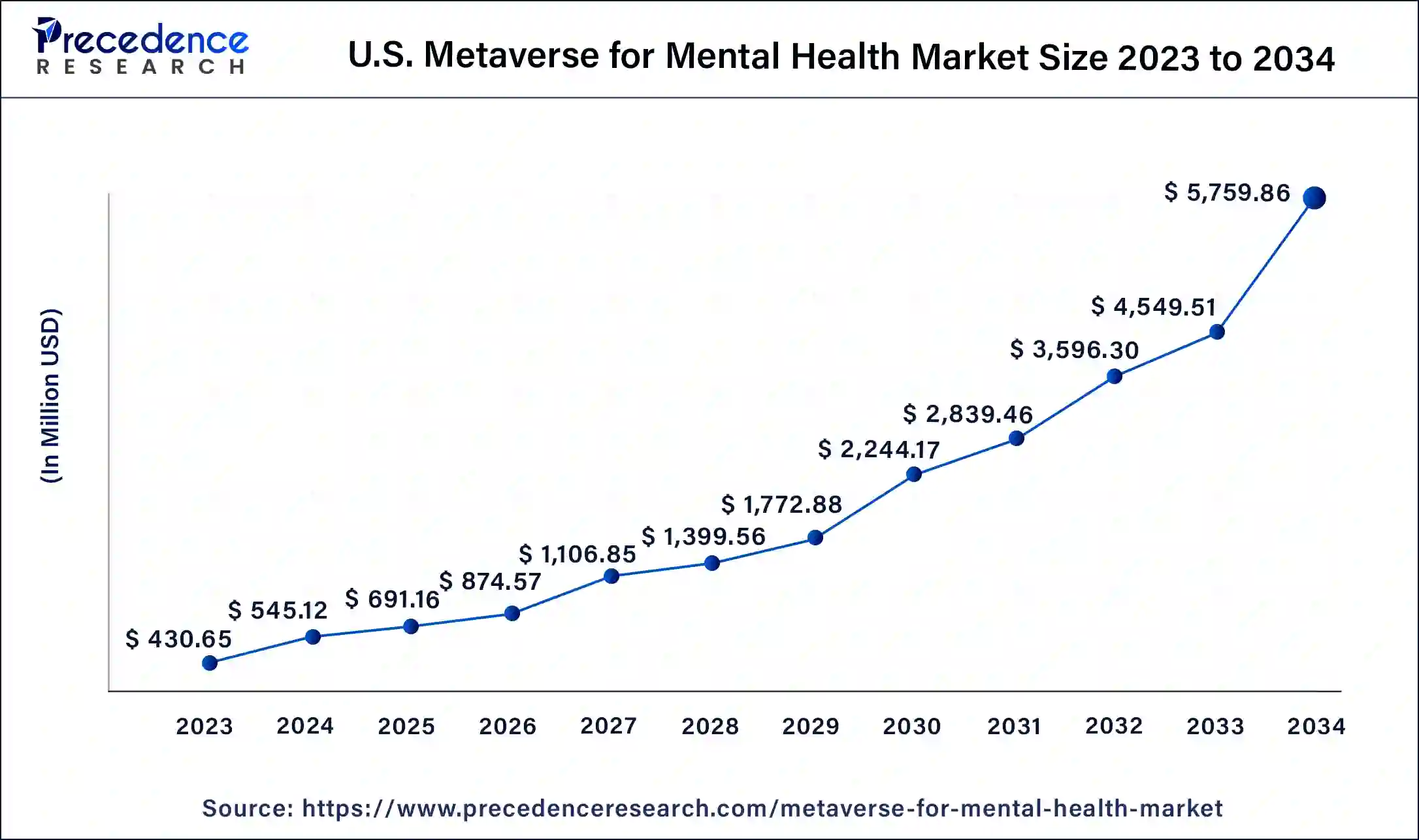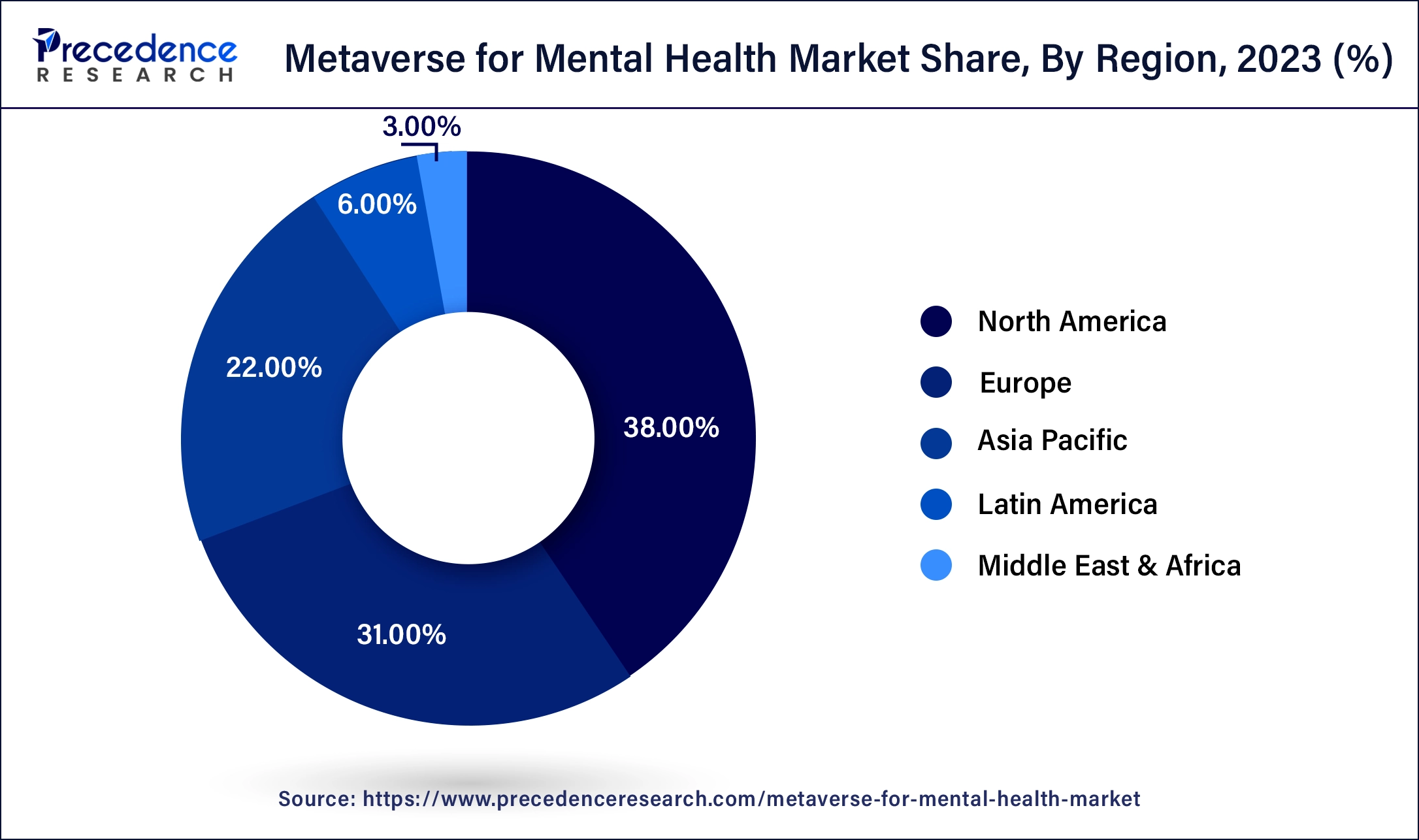December 2024
The global metaverse for mental health market size was USD 1.51 billion in 2023, calculated at USD 1.91 billion in 2024 and is expected to be worth around USD 20.04 billion by 2034. The market is slated to expand at 26.5% CAGR from 2024 to 2034.
The global metaverse for mental health market size is expected to be valued at USD 1.91 billion in 2024 and is anticipated to reach around USD 20.04 billion by 2034, expanding at a CAGR of 26.5% over the forecast period 2024 to 2034. The North America metaverse for mental health market size reached USD 570 million in 2023.

The U.S. metaverse for mental health market size was exhibited at USD 430.65 million in 2023 and is projected to be worth around USD 5,759.86 million by 2034, poised to grow at a CAGR of 26.6% from 2024 to 2034.

North America has held the largest revenue share 38% in 2023. In North America, the metaverse for mental health market is experiencing a significant upsurge, driven by the region's proactive approach to adopting cutting-edge mental health technologies. High smartphone and internet penetration rates and a growing mental health awareness contribute to the robust adoption of metaverse platforms. Moreover, North America boasts a wealth of tech companies and research institutions at the forefront of developing advanced mental health solutions within the metaverse.

Asia Pacific is estimated to observe the fastest expansion. In the region, a similar trend is emerging as the region emphasizes mental health care and destigmatization. Countries like India, China and Japan have been quick to integrate metaverse-based mental health services into their healthcare systems, aiming to bridge the accessibility gap and provide innovative mental health support. Moreover, diverse healthcare landscape and commitment to digital health solutions position it as a growing hub for metaverse innovations in the mental health sector.
The metaverse for mental health market encompasses immersive virtual and augmented reality environments and experiences to address mental health concerns and promote well-being. It offers a range of applications, including virtual therapy sessions, stress reduction and relaxation environments, exposure therapy, mental health education platforms, and more.
Leveraging cutting-edge technology, this market aims to provide individuals with accessible, effective, and engaging mental health solutions. The metaverse for mental health facilitates therapeutic interventions, self-help tools, education, and peer support, contributing to the broader goals of mental health awareness, treatment, and DE stigmatization.
| Report Coverage | Details |
| Growth Rate from 2024 to 2034 | CAGR of 26.5% |
| Market Size in 2023 | USD 1.51 Billion |
| Market Size in 2024 | USD 1.91 Billion |
| Market Size by 2034 | USD 20.04 Billion |
| Largest Market | North America |
| Base Year | 2023 |
| Forecast Period | 2024 to 2034 |
| Segments Covered | By Component, By Application, By Technology, and By End User |
| Regions Covered | North America, Europe, Asia-Pacific, Latin America, and Middle East & Africa |
Mental health accessibility and virtual therapy sessions
The metaverse for mental health market excels in dismantling obstacles to mental health care. It offers readily accessible virtual environments that cater to individuals who may be reluctant or unable to access conventional mental health support due to concerns surrounding stigma, geographical limitations, or the scarcity of available services. In essence, it democratizes access to mental health care, empowering individuals to connect with mental health professionals and resources at their comfort, free from judgment or pressure.
The metaverse offers a revolutionary platform for virtual therapy and counseling sessions. It enables individuals to access professional mental health care from the comfort of their homes, eliminating geographical and logistical obstacles. Virtual therapy sessions are not only convenient but also provide privacy, making them an attractive option for those who value discretion and comfort while addressing their mental health concerns. These innovations in mental health accessibility and virtual therapy sessions are driving the demand for the metaverse for the mental health market, making it a game-changer in the provision of mental health services.
Limited emotional nuance and privacy concerns
While the metaverse for mental health market holds significant promise, several restraints affect its market demand. One major challenge is the limited emotional nuance within virtual environments. While virtual therapy sessions offer convenience, they may lack the depth of emotional connection that face-to-face interactions provide. Subtle emotional cues and non-verbal communication can be challenging to replicate in a digital realm, potentially limiting the effectiveness of therapeutic interventions and reducing the patient's sense of being understood.
Moreover, sharing deeply personal and sensitive mental health information within the metaverse raises legitimate worries about data security and confidentiality. However, there are privacy concerns surrounding these platforms. Users may worry about the security of their personal and sensitive mental health information in the metaverse.
Sharing such data in a digital environment raises legitimate questions about data security and confidentiality. Striking the right balance between delivering effective care and ensuring the protection of patients' sensitive data is a paramount challenge for the industry, and these concerns have an impact on the overall market demand.
Personalized interventions and expanded accessibility
The metaverse for mental health market is experiencing a surge in demand primarily due to its ability to provide personalized interventions and expanded accessibility. The metaverse leverages advanced technologies to offer tailored mental health support, ensuring individuals receive treatment and guidance that aligns with their unique needs. Personalization involves the customization of therapy, content, and interventions based on an individual's mental health profile, preferences, and progress. This tailored approach significantly enhances the effectiveness of mental health care, increasing engagement and positive outcomes.
Furthermore, the metaverse extends mental health services to a broader audience by breaking down geographical barriers and reducing the stigma associated with seeking help. Users can access mental health resources from the comfort of their own homes, providing greater accessibility to those in remote areas or those who may be hesitant to attend traditional in-person sessions. The metaverse also supports real-time interventions, enabling users to receive immediate assistance during moments of crisis. These combined factors have led to a growing demand for metaverse-based mental health solutions, ultimately revolutionizing the mental health care landscape.
According to the component, the hardware segment has held 65% revenue share in 2023. The hardware component encompasses the physical devices required to access the metaverse, such as VR headsets, AR glasses, and biometric sensors. These devices are evolving to become more affordable, comfortable, and user-friendly, allowing individuals to enter virtual environments for mental health support seamlessly. Trends indicate an increasing focus on creating devices with enhanced sensor capabilities for more accurate monitoring of users' mental states.
The software segment is anticipated to expand at a significant CAGR of 28.4% during the projected period. The software aspect includes the platforms, applications, and content that enable mental health interventions within the metaverse. These solutions are designed to deliver a wide range of therapeutic experiences, from guided mindfulness sessions to cognitive-behavioral therapy. Recent trends show the development of AI-driven software capable of personalizing mental health interventions and chatbot companions that provide support and encouragement in the metaverse.
Based on the application, the therapy and counseling segment is anticipated to hold the largest market share of 68% in 2023. In the metaverse for mental health market, therapy and counseling applications are designed to provide users with access to mental health professionals and therapists within a virtual environment. These applications enable users to engage in therapy sessions, seek emotional support, and address their mental health concerns. A significant trend in this segment involves the integration of AI-driven virtual therapists that can provide round-the-clock support, bridging gaps in traditional mental health services and offering convenient, on-demand help.
On the other hand, the mental health education segment is projected to grow at the fastest rate over the projected period. The metaverse for mental health market also features applications focused on mental health education. These applications aim to educate users about various aspects of mental health, such as self-awareness, stress management, and coping strategies. They offer interactive learning experiences that empower individuals to enhance their mental well-being. A notable trend is the gamification of mental health education, making it engaging and fun while effectively disseminating important information. These educational applications serve as preventive tools, helping individuals better understand and manage their mental health.
Based on the application, the therapy and counseling segment held the largest market share of 52% in 2023. Virtual Reality (VR) is a technology that immerses users in entirely virtual environments, isolating them from the physical world. In the context of mental health, VR is often used to create controlled and immersive therapeutic environments. For example, it's effective for exposure therapy, where individuals can confront and process traumatic experiences or phobias in a controlled and safe VR setting. VR can also be used for relaxation exercises, offering users an escape from reality, aiding in meditation, and serving as a tool for immersive cognitive-behavioral therapy.
On the other hand, the mental health education segment is projected to grow at the fastest rate over the projected period. Augmented Reality (AR) is a technology that enhances the real world by overlaying digital information or objects onto the user's view of the physical environment. In the metaverse for mental health market AR provides individuals with context-aware cues and support in their daily lives. For instance, AR apps may offer real-time prompts or guidance for managing stress, practicing mindfulness, or enhancing emotional regulation during everyday activities. These subtle digital overlays can be invaluable in helping users navigate the complexities of their mental health in real-world scenarios.
In 2023, the healthcare institutions segment had the highest market share of 49% on the basis of the end user. In the market, healthcare institutions and mental health professionals play pivotal roles. Healthcare institutions, including hospitals and clinics, are increasingly incorporating metaverse solutions to provide comprehensive mental health services to patients. This trend involves creating virtual clinics within the metaverse, where patients can access therapy, counseling, and support remotely, leading to more accessible and efficient mental health care.
The mental health professionals segment is anticipated to expand at the fastest rate over the projected period. Mental health professionals are actively integrating metaverse technology into their practices, allowing them to offer therapy and counseling services in virtual settings. They utilize this platform to reach a wider client base, provide personalized interventions, and adapt to the evolving landscape of mental health care. Overall, this collaboration between healthcare institutions and mental health professionals is driving the growth of the metaverse for mental health market, making mental health support more accessible, innovative, and efficient.
Segments Covered in the Report
By Component
By Application
By Technology
By End User
By Geography
For inquiries regarding discounts, bulk purchases, or customization requests, please contact us at sales@precedenceresearch.com
No cookie-cutter, only authentic analysis – take the 1st step to become a Precedence Research client
December 2024
February 2025
October 2024
October 2024